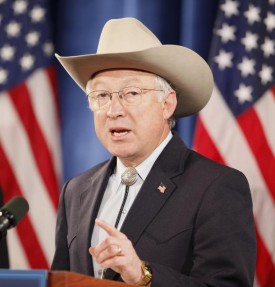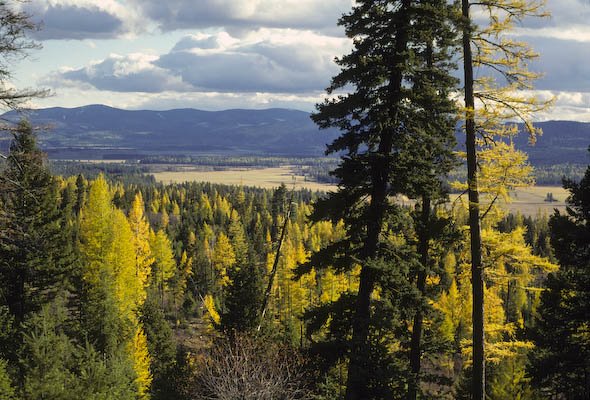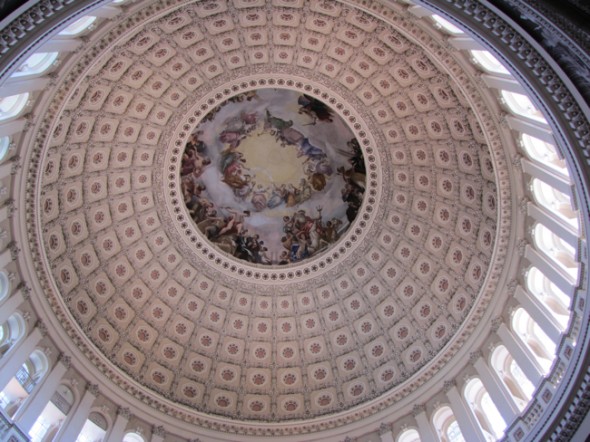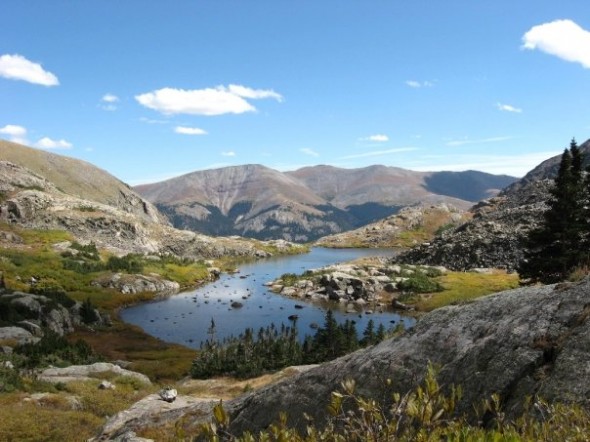Hope for Legacy Omnibus Public Lands Bill
November 23rd, 2010
The Legacy of the 111th Congress: An Election Post-Mortem
Despite several significant, and laudable, legislative victories over its two-year lifespan, the environmental legacy of the 111th Congress has, regrettably, gone largely unfulfilled. Beginning with a hopeful shot in the arm and a potential for greatness in righting an environmental ship left scuttled by the Bush administration’s declawing of regulatory agencies and rollback of environmental law and precedent, Congress made a splash in early 2009 with the passage of a much-delayed public lands bill, shelved throughout the entirety of the Bush administration, which became the Omnibus Public Land Management Act of 2009 upon President Obama signing it into law in March of that year.
Unfortunately, after becoming publicly bogged down in the sausage-making detail of health care reform and Fox News and talk radio-fueled townhall protests that summer, the Democratic majority went on the defensive and failed to follow up with any significant environmental legislation, particularly a climate bill which would have established the U.S. as an environmental and renewable energy leader. As historic as the 111th Congress’ hard-won victories on health care and financial reform are, a climate bill remains conspicuous by its absence, along with no renewed national effort to restore fiscal health to National Parks beyond underfunded Americorps programs.
While Republicans adeptly used parliamentary procedures, the threat of filibuster, and a minority working in lockstep to deny Democrats or the Obama administration any significant victories beyond health care and financial reform, often in a puerile attempt to simply discredit Obama’s standing as president, Democrats never rolled up their sleeves and engaged in tough, Harry Truman-style “buck stops here” politics, nor did the Democrats take on the GOP minority by calling their bluff, forcing Republicans to filibuster bills in the name of far-right litmus tests which otherwise would’ve enjoyed broad public support had the Democratic majority shown more leadership for their agenda and spine in their ideas.
In the opinion of Treehuggers International, many of the electoral casualties of the 111th Congress were the result of the Democrats not actively taking credit for their achievements, and doing a poor job of demonstrating the stark differences between their agenda and GOP challengers. The result? Not only is the funding situation for America’s public lands and special places unlikely to improve in the foreseeable future, even with a Democratic administration in office, but when Americans finally got a credit card reform bill signed into law, it came with the ludicrous addendum of allowing firearms in National Parks in order to appease GOP lawmakers to vote for the bill, thus breaking a long-held tradition dating to the 1930s which was even upheld by the Reagan and first Bush administrations.
Sometimes you have to wonder who your friends are.
With newly-elected, and considerably more extreme GOP lawmakers offsetting Democrats’ once-enviable Senate majority to a near-tie, along with the complete loss of the House of Representatives, the legacy of the 111th Congress may not be what was achieved, but what more could have done had Democrats simply demonstrated greater boldness and leadership, and less concern for focus group testing. Voters not only respond to leaders with good ideas, but leaders who demonstrate competence in making good ideas into law.
The Salazar Interior Department
While the Obama administration has charted a determined centrist course with occasional, if half-hearted, progressive flourishes designed to be rapidly negotiated away at the first sign of GOP resistance, few in the president’s Chicagocentric inner circle have a natural affinity for the west or America’s outdoors beyond seeing it as a necessary, though perhaps tiring component of their coalition.
Previous Democratic administrations had wilderness visionaries leading the Interior Department and aggressively charting a responsible future for America’s National Parks and public lands, like Stewart Udall under President Johnson and Bruce Babbitt under President Clinton. The Obama administration has Ken Salazar, a former Senator, Colorado rancher, and big agriculture and mining ally few in the business world were worried would rock the boat when he was named to the Interior post shortly after Obama’s election.
 Under Salazar the Interior Department quickly reigned in the most egregious, and obvious, Bush-era public lands sins, but as the only westerner in the Obama cabinet, whenever federal public lands matters come up, the questions immediately go to Salazar, who answers them through his particular resource-extraction, business-friendly filter. Literally being the guy in the room wearing the cowboy hat, the administration takes Salazar’s word as representative of prevailing environmental attitudes across the west.
Under Salazar the Interior Department quickly reigned in the most egregious, and obvious, Bush-era public lands sins, but as the only westerner in the Obama cabinet, whenever federal public lands matters come up, the questions immediately go to Salazar, who answers them through his particular resource-extraction, business-friendly filter. Literally being the guy in the room wearing the cowboy hat, the administration takes Salazar’s word as representative of prevailing environmental attitudes across the west.
While an obvious improvement over the darkest days of the Bush Interior Department, especially under Gail Norton, there has been grumbling about Salazar’s performance. Early in 2009 Salazar opted to uphold a Bush-era policy which prevents regulation of greenhouse gas emissions in regards to the Endangered Species Act, and as a veteran rancher, acquiesced to the removal of the Gray Wolf from the Endangered Species List, thereby enabling vicious hunts of the animal in states in Salazar’s Rocky Mountain backyard, like Idaho and Montana.
In the midst of the BP Oil Spill in the Gulf of Mexico Salazar’s Interior Department put all offshore oil drilling activity on hold in the Gulf of Mexico while it reorganized the federal Mineral Management Service, which the Interior Department knew was corrupt and out of control (with parties rampant with drug use and frequent sexual liaisons between regulators and industry figure)s from the moment the administration came into power, only to allow renewed offshore oil exploration even in the most severely affected areas of the Gulf of Mexico before all the questions behind the Deepwater Horizon calamity were answered.
While spearheading America’s Great Outdoors Initiative at the behest of President Obama, Salazar showed excessive favor and leeway to ORV groups, which continue to complain they don’t have enough land for their “sport,” despite abundant greenlaning areas in the nation’s National Forests, and the proven environmental impacts long-term ORV use has on the environment, from air and noise pollution, trail damage, erosion, land degradation, and species and habitat loss, to the spectacular volume of dust kicked into the air in the west which has been proven to affect snowpack in the Sierras and Rockies.
Never Too Late for A Lame-Duck Public Lands Bill
Of course, we recall things were worse just a few short years ago, and as the lame-duck session of the 111th Congress gets underway, there remains hope among conservationists some 21 wilderness and wildland protection bills currently in legislative circulation may be passed as an omnibus public lands bill while Democrats still command effective majorities, albeit on a rapidly vanishing shelf life.
The problem? Lawmakers from both parties have long wish lists, including passing a renewable electricity standard and a bill promoting electric and natural gas vehicles, revising offshore drilling rules, and for many “corn-state” lawmakers, renewing expiring ethanol subsidies. A number of GOP legislators and lawmakers from coal states are also hoping to delay implementation of the EPA’s new carbon emissions regulations.
Perhaps this may prove to be wishful thinking, but the coming shift in the political landscape may compel the outgoing Democratic majority in the House to make a last-ditch push for a public lands “legacy” bill. Such moves are not unusual. The first California Desert Protection Act was passed after the 1994 midterms, which saw outgoing Democratic lawmakers elevate Death Valley and Joshua Tree National Monuments to National Park status, while providing for the creation of the Mojave National Preserve.
In the wake of the 1980 elections the outgoing Carter administration worked with Congress to push through the Alaska National Interest Lands Conservation Act, which created or revised the status of 15 National Park Service properties, and provided for the designation of nearly 125,000 square miles of new public lands, of which a third was set aside as wilderness.
We at Treehuggers International urge you to contact your federal lawmakers and urge them to pass a comprehensive public lands bill before the expiration of the 111th Congress.
You can find your U.S. Represenative in the House of Representatives HERE.
Find your U.S. Senator HERE.
While hand-written letters are always best, time for an omnibus public lands bill is limited to the lame-duck Congressional session. A polite phone call to the offices of a few key lawmakers may help get the ball rolling.
Whatever party they may be, remind legislators of the value of wilderness and wild places, the need to preserve our nation’s natural heritage, and the pride of “legacy” which such a public lands bill provides, especially for outgoing lawmakers. What better gift to leave future generations than the magnificent, undisturbed swaths of America’s natural heritage we are still fortunate enough to enjoy today because of the foresight of others?

Autumn in Montana's Blackfoot Valley, Lolo National Forest.






